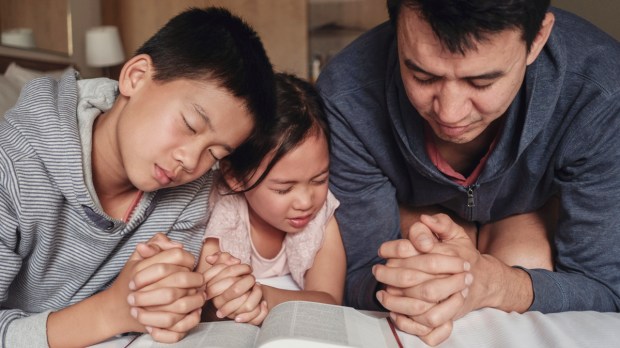There’s no good way to say it: We are in a crisis of Catholics leaving the Church. Somehow, somewhere, along the way, handing down the faith to the next generation is failing, on a mass scale. Catholics are abandoning the faith of their parents and grandparents at a record rate:
Catholicism has experienced a greater net loss due to religious switching than has any other religious tradition in the U.S. Overall, 13% of all U.S. adults are former Catholics – people who say they were raised in the faith, but now identify as religious “nones,” as Protestants, or with another religion. By contrast, 2% of U.S. adults are converts to Catholicism – people who now identify as Catholic after having been raised in another religion (or no religion). This means that there are 6.5 former Catholics in the U.S. for every convert to the faith.
There are plenty of theories about why young people are leaving the Church. Some think we need a more modern approach; others think a return to traditional practices is the solution. But what has the empirical data uncovered? What have researchers found to make a real difference in passing down the faith to the next generation?
A sociologist at the University of Notre Dame, Christian Smith, has dedicated his career to researching religious belief among young people. His newest book, Handing Down the Faith: How Parents Pass Their Religion on to the Next Generation, looks specifically at intergenerational transmission of religion.
“I’ve long been interested in the condition and status of religion in modern society, including families and religion and the spiritual life of young people growing up,” Smith said in an interview with Aleteia.
Back in 2000, Smith started researching religion among adolescents. But that project led him down a different rabbit hole.
“What I learned from that project, that was so surprising to me, was how influential parents are in forming the religious lives of their children, even into their teens and twenties,” Smith said. He was inspired to investigate religious parents and how they transmit their faith to their children.
He and his team did not study only Catholic parents. They looked at parents of many different denominations. To their surprise, parents shared basic similarities across various religions.
“We expected to find a lot of different cultural models, but were surprised by how similarly parents talk, from all different religious and cultural backgrounds,” he said. He was able to uncover some fascinating information about how parents pass down their religious beliefs to their children.
If you’re wondering what matters most in handing down your faith, here’s what you need to know.
1Take ownership of teaching your kids your faith
Some parents assume that their children will get everything they need if they attend a school affiliated with their religion, or religious classes or camps. Unfortunately, that’s not the case.
“Parents should never think of these things as a replacement for what they should be doing in the home,” Smith said. “Most religious formation happens in the home, not in religious congregations.”
At best, things like mission trips, service projects, and youth groups are a reinforcement of what parents are practicing in the home. They can strengthen what parents are already doing, but they can’t take the place of a parental example.
This might sound like bad news, but there are a lot of positives here. Parents often worry that their children, especially their teens, are completely ignoring their example. It turns out that’s absolutely not the case.
“Parents can feel empowered and can feel authorization to form their kids, instead of thinking they become increasingly less relevant as kids get older,” Smith said. “Parents need to decide what kind of family they want to be and then put that into practice.”
2Practice your faith with purpose
If children see that their parents find joy and meaning in religious practice, they will seek that out for themselves. Simply practicing your own faith in front of your child is the most powerful thing you can do.
“If practicing their faith is something parents enjoy and find life-giving, that’ll help,” Smith said.
Things like praying as a family or letting your child see you praying, reading Scripture together, or thanking God for ways he has blessed you deeply affect your children. Parents can show, by word and deed, that religion is something they care about all the time and not just on Sunday mornings or holy days.
There’s a lesson for parishes and schools too: Include parents in religious education. Some have embraced a “family faith formation” model, and that’s likely to have the strongest effect in the long run.
3Parent with loving connection and firm boundaries
Psychological researchers have identified 4 broad styles of parenting: Authoritarian, Authoritative, Permissive, and Uninvolved. Kids who have authoritative parents consistently have the best long-term outcomes. This kind of parenting involves warm, loving connection coupled with firm boundaries and consistent discipline.
It turns out that authoritative parents are also the most likely to successfully transmit their faith to their children. “It really matters for parents to have rules and standards and expectations, but also to be warm and close and connected with their children. That’s the kind of parent-child relationship where children are most likely to respect and want to please and follow their parents,” Smith said.
This effect is found across all denominations and even no denomination. “That’s also true for atheist parents. It’s a general influence of bonding with kids and kids respecting parents.”
4Find a welcoming religious community
“If church is where kids have friends and other adults they know and like, and it’s interesting and they’re connecting with other people, that’ll help them be self-motivated rather than a case of the parents dragging them along,” he said. “If they can personalize and internalize it, then increasingly they’re motivated to stay connected to it.”
This internalization process is something that parents can indirectly encourage through surrounding children with supportive influences. As children get older, they are more influenced by peers and adults besides their parents. This is when parents can “channel for internalization,” as Smith puts it. While non-parental influences pale in comparison to the impact of parents, they can still make a meaningful difference. He writes for First Things,
Sociologists of religion call this religious “channeling.” The idea is that parents channel their children into involvements and relationships that reinforce (not replace) their more direct parental influence. Channeling means subtly nudging, introducing, and steering children in the “right” religious directions. Good channeling is purposeful and even strategic but not controlling or overbearing. It creates opportunities, makes introductions, and encourages involvement. It does not coerce or bribe children into religion.
The goal of religious channeling is for children to personalize and internalize their religious faith and identity over time. When channeling is effective, children, as they approach independent adulthood, think of themselves more as people who believe and practice their own faith, rather than as kids who go along with their parents …
Research suggests that among the most important of these channeling influences is the presence of non-family adults in religious congregations who know the children well and can engage them in talk on serious topics, beyond superficial chitchat. The more such adults are present, the more a church, temple, synagogue, or mosque feels like a community or an extended family, which is itself a strong bonding force.
Put another way, he said, “Let religion be important in your child’s own life.”
A friendly and welcoming religious community may be less important for young children, who may not be very aware of adults besides their parents, but it’s increasingly significant for teens and young adults. It really helps children choose to stay Catholic if they grow up surrounded by good adult role models and supportive peers.
All this is only the beginning of the fascinating research Smith and his co-author, Amy Adamczyk, share in Handing Down the Faith. It’s an essential read for anyone involved in forming the next generation of Catholics.



